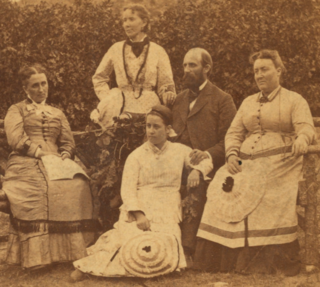Related Research Articles

Polygyny is a form of polygamy entailing the marriage of a man to several women. The term polygyny is from Neoclassical Greek πολυγυνία (polugunía); from Ancient Greek πολύ (polú) 'many', and γυνή (gunḗ) 'woman, wife'.
Polygamy is the practice of marrying multiple spouses. When a man is married to more than one wife at the same time, it is called polygyny. When a woman is married to more than one husband at the same time, it is called polyandry. In sociobiology and zoology, researchers use polygamy in a broad sense to mean any form of multiple mating.

Polygamy was practiced by leaders of the Church of Jesus Christ of Latter-day Saints for more than half of the 19th century, and practiced publicly from 1852 to 1890 by between 20 and 30 percent of Latter-day Saint families.

In a culture where only monogamous relationships are legally recognized, bigamy is the act of entering into a marriage with one person while still legally married to another. A legal or de facto separation of the couple does not alter their marital status as married persons. In the case of a person in the process of divorcing their spouse, that person is taken to be legally married until such time as the divorce becomes final or absolute under the law of the relevant jurisdiction. Bigamy laws do not apply to couples in a de facto or cohabitation relationship, or that enter such relationships when one is legally married. If the prior marriage is for any reason void, the couple is not married, and hence each party is free to marry another without falling foul of the bigamy laws.

The Fundamentalist Church of Jesus Christ of Latter-Day Saints is a religious sect of the fundamentalist Mormon denominations whose members practice polygamy. It is variously defined as a cult, a sect, or a new religious movement.

Mormon fundamentalism is a belief in the validity of selected fundamental aspects of Mormonism as taught and practiced in the nineteenth century, particularly during the administrations of Joseph Smith, Brigham Young, and John Taylor, the first three presidents of the Church of Jesus Christ of Latter-day Saints. Mormon fundamentalists seek to uphold tenets and practices no longer held by mainstream Mormons. The principle most often associated with Mormon fundamentalism is plural marriage, a form of polygyny first taught in the Latter Day Saint movement by the movement's founder, Smith. A second and closely associated principle is that of the United Order, a form of egalitarian communalism. Mormon fundamentalists believe that these and other principles were wrongly abandoned or changed by the LDS Church in its efforts to become reconciled with mainstream American society. Today, the LDS Church excommunicates any of its members who practice plural marriage or who otherwise closely associate themselves with Mormon fundamentalist practices.
Polygamy is the practice of having more than one spouse at the same time. Specifically, polygyny is the practice of one man taking more than one wife while polyandry is the practice of one woman taking more than one husband. Polygamy is a common marriage pattern in some parts of the world. In North America, polygamy has not been a culturally normative or legally recognized institution since the continent's colonization by Europeans.
As Yemen is a mostly-Muslim nation, polygamy is lawful. Polygamy is permissible in Islam up to four wives, as long as the husband devotes equal attention to each of them.

Under civil law, Nigeria does not recognize polygamous unions. However, 12 out of the 36 Nigerian states recognize polygamous marriages as being equivalent to monogamous marriages. All twelve states are governed by Sharia law. The states, which are all northern, include the states of Bauchi, Borno, Gombe, Jigawa, Kaduna, Kano, Katsina, Kebbi, Niger, Sokoto, Yobe, and Zamfara which allows for a man to take more than one wife.
Polygamy is illegal in France and has been the center of recent political debates, due to surges of Malian immigrants living polygamously in the country. Due to such, stricter laws have been enforced to stomp out polygamy.

Polygamous unions, specifically polygynous unions, are legal in the island nation of the Maldives, though such unions have been reported to be uncommon. Fifty-nine polygamous marriages took place in 1998. Polygamy is also specifically covered by a 2001 Maldivian law, which orders courts to assess a man's finances before letting him take another wife.
The practice of what is usually called polygamy, enjoys de facto and de jure legality in Kenya. It is to be understood as polygyny, however.
Polygamy in Chad is legal and it is commonly practiced. Chad is part of the "polygamy belt", a region in Africa which includes countries in West and Central Africa where polygamy is common and deeply rooted in the culture.
Polygamous marriages are not recognized in the Russian Federation. The Family Code of Russia states that a marriage can only be contracted between a man and a woman, neither of whom is married to someone else. Furthermore, Russia does not recognize polygamous marriages that had been contracted in other countries. Under Russian law, de facto polygamy or multiple cohabitation in and of itself is not a crime.
The legal status of polygamy varies widely around the world. Polygyny is legal in 58 out of nearly 200 sovereign states, the vast majority of them being Muslim-majority countries. Some countries that permit polygamy have restrictions, such as requiring the first wife to give her consent.
Polygamy is not legally recognised in Australia. Legally recognised polygamous marriages may not be performed in Australia, and a person who marries another person, knowing that the previous marriage is still subsisting, commits an offence of bigamy under section 94 of the Marriage Act 1961, which carries a maximum penalty of 5 years imprisonment. However, the offence of bigamy only applies to attempts to contract a legally recognised marriage; it does not apply to polygamous marriages where there is no attempt to gain recognition for the marriage under Australian law. Whether or not either or both partners were aware of the previous subsisting marriage, the second marriage is void. Foreign polygamous marriages are not recognized in Australia. However, a foreign marriage that is not polygamous but could potentially become polygamous at a later date under the law of the country where the marriage took place is recognized in Australia while any subsequent polygamous marriage is not. While under Australian law a person can be in at most one legally valid marriage at a time, Australian law does recognise that a person can be in multiple de facto relationships concurrently, and as such entitled to the legal rights extended to members of de facto relationships.
Polygamy is the practice of having more than one spouse; while prohibited under Zimbabwean civil law, polygamous marriages may be performed under the country's customary law. Less than one-fifth of the country's population are engaged in polygamy.
The practice of polygamy has had a long history in Kazakhstan, which officially decriminalized the practice in 1998, being the only Central Asian country to do so. Polygamous marriages are not recognized under the law, but bigamy is not a crime. In practice, polygamy is common in Kazakhstan, and is often seen as a sign of a man's social prestige.
Polygamy is a system of marriage in which one man marries more than one woman
Polygamy in Guinea is generally illegal. Polygamy is regulated under the new 2019 family law. The new regulations stipulate that a marriage is presumed to be monogamous; however a couple may legally enter into a polygynous marriage if the groom declares that he is opting for polygyny during the marriage ceremony and the bride gives "explicit consent". The new law is the result of a long legislative battle between those who wanted free polygamy without restrictions and those who wanted a complete ban.
References
- ↑ Tajikistan: Family Code
- ↑ Greenberg, Ilan (2006-11-13). "After a Century, Public Polygamy Is Re-emerging in Tajikistan". The New York Times. ISSN 0362-4331 . Retrieved 2023-10-02.
- ↑ Saidazimova, Gulnoza (2012-02-02). "Here Come The Brides". Radio Free Europe/Radio Liberty. Retrieved 2023-10-02.